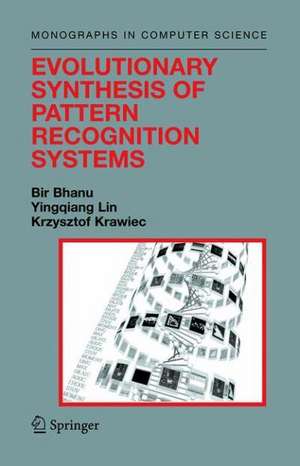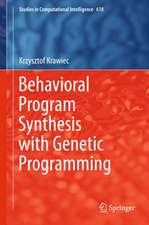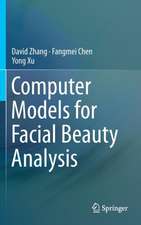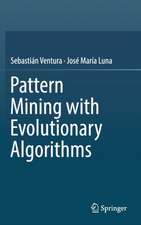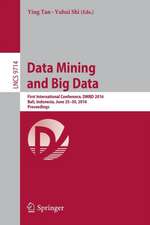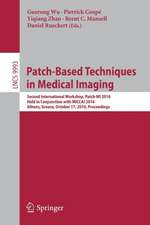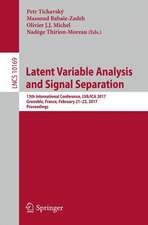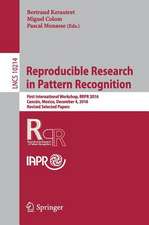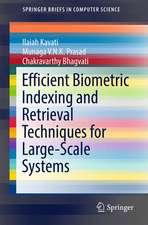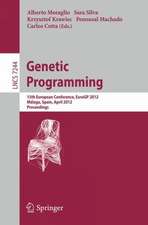Evolutionary Synthesis of Pattern Recognition Systems: Monographs in Computer Science
Autor Bir Bhanu, Yingqiang Lin, Krzysztof Krawiecen Limba Engleză Paperback – 29 noi 2010
This unique monograph investigates evolutionary computational techniques--such as genetic programming, linear genetic programming, coevolutionary genetic programming and genetic algorithms--to automate the synthesis and analysis of object detection and recognition systems.
The purpose of incorporating learning into the system design is to avoid the time-consuming process of feature generation and selection and to reduce the cost of building object detection and recognition systems.
Researchers, professionals, engineers, and students working in computer vision, pattern recognition, target recognition, machine learning, evolutionary learning, image processing, knowledge discovery and data mining, cybernetics, robotics, automation and psychology will find this well-developed and organized volume an invaluable resource.
| Toate formatele și edițiile | Preț | Express |
|---|---|---|
| Paperback (1) | 988.16 lei 6-8 săpt. | |
| Springer – 29 noi 2010 | 988.16 lei 6-8 săpt. | |
| Hardback (1) | 995.24 lei 6-8 săpt. | |
| Springer – 17 feb 2005 | 995.24 lei 6-8 săpt. |
Din seria Monographs in Computer Science
- 20%
 Preț: 1322.33 lei
Preț: 1322.33 lei - 20%
 Preț: 511.92 lei
Preț: 511.92 lei - 20%
 Preț: 1285.31 lei
Preț: 1285.31 lei - 20%
 Preț: 333.22 lei
Preț: 333.22 lei - 20%
 Preț: 328.60 lei
Preț: 328.60 lei - 15%
 Preț: 646.94 lei
Preț: 646.94 lei - 20%
 Preț: 357.48 lei
Preț: 357.48 lei - 20%
 Preț: 339.47 lei
Preț: 339.47 lei - 20%
 Preț: 653.21 lei
Preț: 653.21 lei - 20%
 Preț: 329.44 lei
Preț: 329.44 lei - 20%
 Preț: 993.74 lei
Preț: 993.74 lei - 20%
 Preț: 992.26 lei
Preț: 992.26 lei - 20%
 Preț: 1630.95 lei
Preț: 1630.95 lei - 20%
 Preț: 656.03 lei
Preț: 656.03 lei - 20%
 Preț: 650.08 lei
Preț: 650.08 lei - 20%
 Preț: 328.09 lei
Preț: 328.09 lei - 20%
 Preț: 641.16 lei
Preț: 641.16 lei - 20%
 Preț: 334.38 lei
Preț: 334.38 lei - 18%
 Preț: 737.74 lei
Preț: 737.74 lei - 20%
 Preț: 642.19 lei
Preț: 642.19 lei - 20%
 Preț: 641.99 lei
Preț: 641.99 lei - 20%
 Preț: 345.59 lei
Preț: 345.59 lei - 20%
 Preț: 711.29 lei
Preț: 711.29 lei - 20%
 Preț: 1001.16 lei
Preț: 1001.16 lei - 20%
 Preț: 661.47 lei
Preț: 661.47 lei - 20%
 Preț: 343.62 lei
Preț: 343.62 lei - 20%
 Preț: 644.81 lei
Preț: 644.81 lei - 15%
 Preț: 505.30 lei
Preț: 505.30 lei - 20%
 Preț: 640.69 lei
Preț: 640.69 lei -
 Preț: 396.78 lei
Preț: 396.78 lei - 18%
 Preț: 956.81 lei
Preț: 956.81 lei - 20%
 Preț: 592.68 lei
Preț: 592.68 lei - 20%
 Preț: 329.44 lei
Preț: 329.44 lei -
 Preț: 383.33 lei
Preț: 383.33 lei - 20%
 Preț: 349.40 lei
Preț: 349.40 lei - 20%
 Preț: 832.40 lei
Preț: 832.40 lei - 20%
 Preț: 993.42 lei
Preț: 993.42 lei - 15%
 Preț: 578.87 lei
Preț: 578.87 lei - 20%
 Preț: 337.85 lei
Preț: 337.85 lei - 20%
 Preț: 996.56 lei
Preț: 996.56 lei - 20%
 Preț: 1293.37 lei
Preț: 1293.37 lei - 20%
 Preț: 1452.94 lei
Preț: 1452.94 lei
Preț: 988.16 lei
Preț vechi: 1235.19 lei
-20% Nou
Puncte Express: 1482
Preț estimativ în valută:
189.11€ • 205.34$ • 158.85£
189.11€ • 205.34$ • 158.85£
Carte tipărită la comandă
Livrare economică 22 aprilie-06 mai
Preluare comenzi: 021 569.72.76
Specificații
ISBN-13: 9781441919434
ISBN-10: 1441919430
Pagini: 320
Ilustrații: XXIV, 296 p. 95 illus.
Dimensiuni: 155 x 235 x 17 mm
Greutate: 0.45 kg
Ediția:Softcover reprint of hardcover 1st ed. 2005
Editura: Springer
Colecția Springer
Seria Monographs in Computer Science
Locul publicării:New York, NY, United States
ISBN-10: 1441919430
Pagini: 320
Ilustrații: XXIV, 296 p. 95 illus.
Dimensiuni: 155 x 235 x 17 mm
Greutate: 0.45 kg
Ediția:Softcover reprint of hardcover 1st ed. 2005
Editura: Springer
Colecția Springer
Seria Monographs in Computer Science
Locul publicării:New York, NY, United States
Public țintă
ResearchCuprins
Feature Synthesis for Object Detection.- Mdl-Based Efficient Genetic Programming for Object Detection.- Feature Selection for Object Detection.- Evolutionary Feature Synthesis for Object Recognition.- Linear Genetic Programming for Object Recognition.- Applications of Linear Genetic Programming for Object Recognition.- Summary and Future Work.
Textul de pe ultima copertă
Designing object detection and recognition systems that work in the real world is a challenging task due to various factors including the high complexity of the systems, the dynamically changing environment of the real world and factors such as occlusion, clutter, articulation, and various noise contributions that make the extraction of reliable features quite difficult.
Evolutionary Synthesis of Pattern Recognition Systems presents novel effective approaches based on evolutionary computational techniques, such as genetic programming (GP), linear genetic programming (LGP), coevolutionary genetic programming (CGP) and genetic algorithms (GA) to automate the synthesis and analysis of object detection and recognition systems. The book’s concepts, principles, and methodologies will enable readers to automatically build robust and flexible systems—in a systematic manner—that can provide human-competitive performance and reduce the cost of designing and maintaining these systems. Its content covers all key aspects of object recognition: object detection, feature selection, feature discovery, object recognition, domain knowledge. Basic knowledge of programming and data structures, and some calculus, is presupposed.
Topics and Features:
*Presents integrated coverage of object detection/recognition systems
*Describes how new system features can be generated "on the fly," and how systems can be made flexible and applied to a variety of objects and images
*Demonstrates how object detection and recognition systems can be automatically designed and maintained in a relatively inexpensive way
*Explains automatic synthesis and creation of programs (which saves valuable human and economic resources)
*Focuses on results using real-world imagery, thereby concretizing the book’s novel ideas
This accessible monograph provides thecomputational foundation for evolutionary synthesis involving pattern recognition and is an ideal overview of the latest concepts and technologies. Computer scientists, researchers, and electrical and computer engineers will find the book a comprehensive resource, and it can serve equally well as a text/reference for advanced students and professional self-study.
Evolutionary Synthesis of Pattern Recognition Systems presents novel effective approaches based on evolutionary computational techniques, such as genetic programming (GP), linear genetic programming (LGP), coevolutionary genetic programming (CGP) and genetic algorithms (GA) to automate the synthesis and analysis of object detection and recognition systems. The book’s concepts, principles, and methodologies will enable readers to automatically build robust and flexible systems—in a systematic manner—that can provide human-competitive performance and reduce the cost of designing and maintaining these systems. Its content covers all key aspects of object recognition: object detection, feature selection, feature discovery, object recognition, domain knowledge. Basic knowledge of programming and data structures, and some calculus, is presupposed.
Topics and Features:
*Presents integrated coverage of object detection/recognition systems
*Describes how new system features can be generated "on the fly," and how systems can be made flexible and applied to a variety of objects and images
*Demonstrates how object detection and recognition systems can be automatically designed and maintained in a relatively inexpensive way
*Explains automatic synthesis and creation of programs (which saves valuable human and economic resources)
*Focuses on results using real-world imagery, thereby concretizing the book’s novel ideas
This accessible monograph provides thecomputational foundation for evolutionary synthesis involving pattern recognition and is an ideal overview of the latest concepts and technologies. Computer scientists, researchers, and electrical and computer engineers will find the book a comprehensive resource, and it can serve equally well as a text/reference for advanced students and professional self-study.
Caracteristici
Integrates computer vision, pattern recognition, and AI Presents original research that will benefit researchers and professionals in computer vision, pattern recognition, target recognition, machine learning, evolutionary learning, image processing, knowledge discovery and data mining, cybernetics, robotics, automation and psychology
